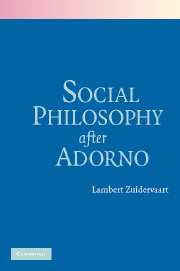Book contents
- Frontmatter
- Contents
- Preface
- Abbreviations
- Introduction: Thinking Otherwise
- 1 Transgression or Transformation
- 2 Metaphysics after Auschwitz
- 3 Heidegger and Adorno in Reverse
- 4 Globalizing Dialectic of Enlightenment
- 5 Autonomy Reconfigured
- 6 Ethical Turns
- Appendix: Adorno's Social Philosophy
- Bibliography
- Index
3 - Heidegger and Adorno in Reverse
Published online by Cambridge University Press: 18 December 2009
- Frontmatter
- Contents
- Preface
- Abbreviations
- Introduction: Thinking Otherwise
- 1 Transgression or Transformation
- 2 Metaphysics after Auschwitz
- 3 Heidegger and Adorno in Reverse
- 4 Globalizing Dialectic of Enlightenment
- 5 Autonomy Reconfigured
- 6 Ethical Turns
- Appendix: Adorno's Social Philosophy
- Bibliography
- Index
Summary
A transformed philosophy … would be nothing but full, unreduced experience in the medium of conceptual reflection.
Adorno, Negative DialecticsThe dialectical extremes of twentieth-century German philosophy touch in their conceptions of truth. More specifically, they touch in their conceptions of how truth is authenticated. Whereas Martin Heidegger says this occurs in the “authenticity” of Dasein, Theodor Adorno locates the authentication of truth in “emphatic experience.” I wish to explore this dialectic, using Heidegger's Being and Time and Adorno's Negative Dialectics as my primary sources. Like Heidegger and Adorno, I consider truth to be a comprehensive idea that cannot be reduced to notions of propositional correctness or empirical accuracy. But I also regard correctness and accuracy as indispensable dimensions of truth. Similarly, I take authentication to be a comprehensive attestation of truth that cannot be reduced to discursive justification or verification. Yet justification and verification are inescapable ingredients of authentication.
My exploration has three stages. First, I summarize and criticize Heidegger's account of authenticity. Next, I examine Adorno's appeal to emphatic experience. Portraying “authenticity” and “emphatic experience” as each other's reverse image, I claim that neither one suffices to authenticate truth. Then, I draw out the significance of these dialectical extremes by proposing an alternative account of authentication.
- Type
- Chapter
- Information
- Social Philosophy after Adorno , pp. 77 - 106Publisher: Cambridge University PressPrint publication year: 2007



